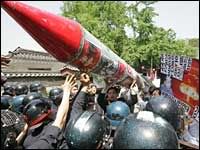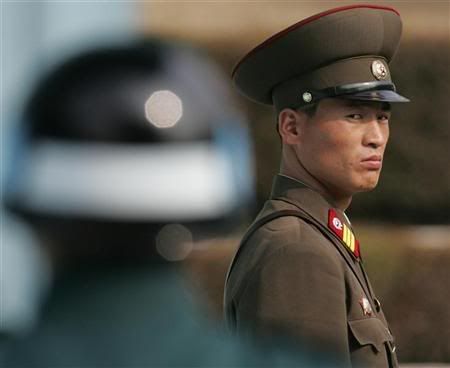Three is a Charm: North Korea and Nuclear Tests
 South Korean protesters carrying a mock North Korean missile are blocked by riot policemen at a rally against the North' nuclear ambition in Seoul on May 4, 2005. (Photo and caption from Nuclear Test is a Possibility for North Korea at NPR.org)
South Korean protesters carrying a mock North Korean missile are blocked by riot policemen at a rally against the North' nuclear ambition in Seoul on May 4, 2005. (Photo and caption from Nuclear Test is a Possibility for North Korea at NPR.org)
Just when I was bemoaning the fact that news out of Korea has ebbed to a dull low and that I’d have to continue writing about other places, Korea has delivered three stories back to back. Of course, as it goes, the third one in a trilogy is always the kicker.
While both the prostitution/human trafficking and smart clothes are pretty much inconsequential to world peace this last one is about ABC News reporting that there are suspicious movements in North Korea that indicate they’re preparing for a nuclear test.
:::insert frustrated moan here:::
At this point they’re just reports of activity near a suspected site, but still…
:::insert another frustrated moan here:::
It only brings home the meaning of the saying "be careful what you pray for, you just might get it."
Now from the perspective of Kim Jong-Il and the power elites in the North, I see the reasons behind wanting nuclear weapons and bluffing. If the world knows you have them, they’re going hopefully tread lightly with you because all it takes is one to kill a lot of people, cause a lot of senseless suffering and damage, and make wherever it strikes a radioactive wasteland.
Of course, what it’s doing is drawing attention back to North Korea which is always one purpose of moves like this. Unfortunately, it’s affecting the markets too. The reports now indicate that the Yen has fallen based to a record low against the Euro based on fears of these tests.
North Korea has been saying that they have nuclear weapons since February of 2005. It wouldn’t be surprising if they do or if they achieve it eventually considering the continued series botched diplomacy that happens in relation to the DPRK. The huge amount of resources that get siphoned off by Pyongyang that is then channeled to their military and weapons is signficant. In terms of forcing North Korea to change the other five parties in the six party talks are a pathetic lot. South Korea doesn’t want to anger or inflame North Korea as technically they’re still at war. It would rock society as well as their vibrant economy as well as the world economy. The US doesn’t want a war either as we’re in an alliance that is set like a tripwire. Basically, if something happens, we’re automatically pulled into the conflict because of the US military's proximity to it all. As we all know, there are both South Korean and US soldiers are on the DMZ at 판문점, Panmunjom, face to face with North Korean soldiers. China as North Korea’s biggest ally doesn’t want war because of many reasons but the biggest being that they’re also nurturing the growth of an economy that, if things go right, will eclipse everyone's in years to come. Russia seems to be more concerned with focusing on its European neighbors than its Asian ones and doesn’t really seem to be all that concerned with North Korea except when they're stirring things up as they are now.
In terms of forcing North Korea to change the other five parties in the six party talks are a pathetic lot. South Korea doesn’t want to anger or inflame North Korea as technically they’re still at war. It would rock society as well as their vibrant economy as well as the world economy. The US doesn’t want a war either as we’re in an alliance that is set like a tripwire. Basically, if something happens, we’re automatically pulled into the conflict because of the US military's proximity to it all. As we all know, there are both South Korean and US soldiers are on the DMZ at 판문점, Panmunjom, face to face with North Korean soldiers. China as North Korea’s biggest ally doesn’t want war because of many reasons but the biggest being that they’re also nurturing the growth of an economy that, if things go right, will eclipse everyone's in years to come. Russia seems to be more concerned with focusing on its European neighbors than its Asian ones and doesn’t really seem to be all that concerned with North Korea except when they're stirring things up as they are now.
While both North Korea's allies and foes are figuring out what to do the North has been busy.
North Korea pretty much is the failed state that cried wolf. They have used such activities as a bluff in the past to stir fears that they were preparing for tests that never happened. This could merely be grandstanding to show that they’re not pleased with the UN Security Council Resolution 1695 which condemned their missile tests on July 5th. Considering their allies China and Russia are permanent members with veto power, maybe they were surprised the resolution got through at all and this is a show to them as well as its traditional foes.
Here is how the folks at Reuters have summarized the history, just in case you need a primer:
Fears about North Korea's nuclear ambitions were heightened when Pyongyang defied international warnings and fired seven missiles into waters east of the Korean peninsula on July 5. The United Nations Security Council passed a resolution condemning the launches.Let’s hope that Pinkson’s assessment of this is correct and it’s just yet another bluff.
North Korea declared itself a nuclear power in February 2005 without testing. Talk on ending its nuclear program among the two Koreas, China, Japan, Russia and the United States have been stalled since November.
Daniel Pinkston, director of the East Asia Nonproliferation Program at the Center for Nonproliferation Studies in Monterey, California, said North Korean leader Kim Jong-Il has bluffed in the past to get U.S. attention.
Last year, activity at suspected North Korean test sites led some analysts to believe the secretive state was preparing to test a nuclear device, but nothing happened.
In 1998, U.S. spy satellites detected a flurry of activity at an underground site at Kumchangri in North Korea designed to hold a plutonium reprocessing reactor.
But Pinkston said in a telephone interview that North Korea was "very unhappy" about the U.N. resolution following its missile tests and might want to show that "under pressure and in an atmosphere of hostility they won't disarm." (Click here for the full article).
However, these bluffs could be more than grand standing and more of a distraction away from North Korea's activities as a weapons and weapons technology peddler. In Missiles and Madness published in the Asia Times, Richard Bennett basically believes the danger isn't so much North Korea being a direct threat but North Korea being an ally of nation-states hostile to the US. The risk is they'll continue to sell their missile and nuclear technology for cash to survive and stay in power.
While North Korea is undoubtedly a poor country, it has still managed to develop advanced and effective missile systems. Not even economic failure, famine and a severe lack of human resources have prevented the headlong dash for weapons technology.Considering the unsophisticated and failed “do what we say or we’ll call you names” approach of the Bush administration, I would say that North Korea is firmly established to be a weapons peddler to nation-states that consider the US to be their enemy for a long time.
While such arms are obviously considered vital for defense or even a preemptive strike, the major overriding reason has been financial: such technology is available for export to the highest bidder.
Such hard-currency transactions help keep North Korea afloat and the regime in power. Over the past 20 years or so North Korea has earned substantial revenue from the sale of missiles, and the relevant technology, to a number of states high on Washington's hit-list. Among these are the Nodong to Pakistan as the Ghauri and to Iran as the Shehab 3, while both Syria and Libya received Hwasong-5. It is reported that missile parts and technology have also been exported to Egypt, the United Arab Emirates and Vietnam.
It appears certain that North Korea's nuclear-weapons program has been largely funded by the sale of missiles and other conventional arms to countries around the world.
North Korea is believed to have some 120 nuclear weapons, including a small number of hydrogen bombs to go with its growing arsenal of operational long-range ballistic missiles. It has built a considerable capability since the early 1960s with nuclear-research facilities at Yongbyon, Taechon, Pyongyang and Kumho. Significantly for North Korea, it is fortunate to have its own uranium mines, with more than 4 million tonnes of exploitable high-quality uranium.
An advanced chemical and biological warfare program has produced a considerable number of chemical warheads for battlefield missiles, aircraft bombs and artillery shells. These are known to include modern nerve agents. It is believed that a serious attempt has also been made to weaponize anthrax and that a small number of warheads may have been deployed.
With such a willing market for its missile technology and the financial advantages gained from the exportation of such weapons, why not offer the secrets of the nuclear bomb as well?
With the looming confrontation with the West over Iran's own nuclear program and an economy rich in petrodollars, Tehran would be a prime market for Pyongyang's weapons know-how. Tehran is North Korea's closest ally in the Middle East.
This would be the ultimate nightmare scenario for Washington, a determined Iranian enemy secure behind the unexpected deployment of an operational long-range missile system armed with a nuclear warhead. (Click here for the full article)
More sources:
N. Korea Watched for Possible Nuke Test
U.S. puzzles over N. Korea n-site
North Korea may be preparing nuclear test
N.Korea atomic test seen harming NE Asia economies
*second picture taken from Reuters.com Sphere: Related Content












Hello!
ReplyDeleteSuper Jaca.
Hi dear. Thanks for stopping by and leaving a comment ;-)
ReplyDelete